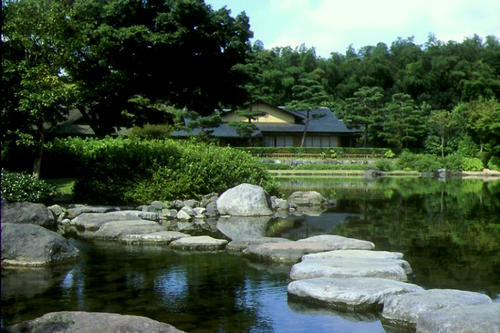早秋山居
溫庭筠 (晚唐詩人)
山近覺寒早,草堂霜氣晴。
樹凋窗有日,池滿水無聲。
果落見猿過,葉乾聞鹿行。
素琴機慮靜,空伴夜泉清。
“Mountain Life in Early Autumn”
Living close to the mountain will find the autumn coldness early.
A sunny weather but is with humid rooms.
Look out the sun and the decaying trees through windows.
Pond is filled full with water without noise.
Fruits fall when you see monkey passing by.
Cracked sounds from dried leaf remind you the walking deer.
Playing a plucked instrument in the serene moment,
Emptiness in dark night is accompanied with silent water flow,
my mind stays in tranquility.
—-Zen Poem by Wen Tin-Yun (812–867)—–
Zen poem helps to examine our practice:
A Zen poem normally describes the status of awakened mind,
the insight and the phenomena of meditation through a daily life.
The life of a Zen practitioner during his waking hours, no matter
he is standing or walking, sitting or lying down, he practices the
way with full-mindfulness and with gratitude.
Reflection from this poem:
The author uses his bodily senses of feeling, visual and hearing
to observe the mountain life with seasonal weather change, sunny,
temperature, humidity.
He also observed from fruit falling, trees decaying, dry leaves
cracked, monkey, deer, waters, pond, etc. to describe where the
quiet mountain he lives and what happens around him. He observed
from sunny daylight with noises to quiet night. He observes from
external materialized world to his inner purified world, from existence
to emptiness.
The echoes of music instrument played in the peaceful dark night
sky will help to eliminate the burdens of daytime works. The serenity
with peace in the mountain demonstrates the law of nature. The author
melts himself into the nature and practices to purify his mind with less
desires, clinging and delusions.
Conclusion:
Not holding to the fixed views,
Endowed with insight,
Freed from sense appetites,
One who achieves the way
will be freed from the duality of Birth and Death.


 字體:小 中 大
字體:小 中 大









